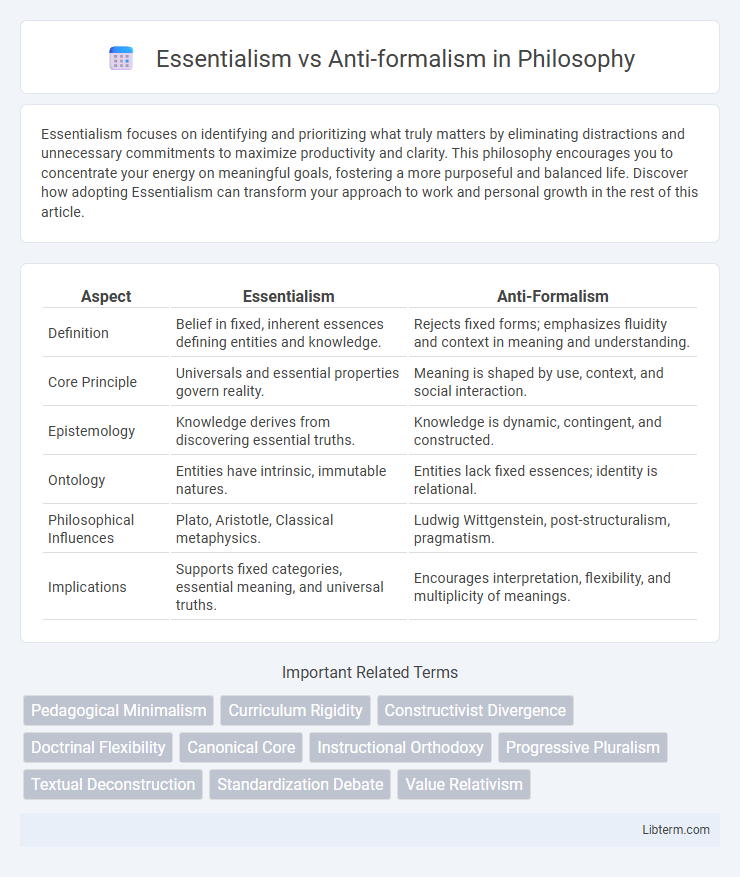Essentialism focuses on identifying and prioritizing what truly matters by eliminating distractions and unnecessary commitments to maximize productivity and clarity. This philosophy encourages you to concentrate your energy on meaningful goals, fostering a more purposeful and balanced life. Discover how adopting Essentialism can transform your approach to work and personal growth in the rest of this article.
Table of Comparison
| Aspect | Essentialism | Anti-Formalism |
|---|---|---|
| Definition | Belief in fixed, inherent essences defining entities and knowledge. | Rejects fixed forms; emphasizes fluidity and context in meaning and understanding. |
| Core Principle | Universals and essential properties govern reality. | Meaning is shaped by use, context, and social interaction. |
| Epistemology | Knowledge derives from discovering essential truths. | Knowledge is dynamic, contingent, and constructed. |
| Ontology | Entities have intrinsic, immutable natures. | Entities lack fixed essences; identity is relational. |
| Philosophical Influences | Plato, Aristotle, Classical metaphysics. | Ludwig Wittgenstein, post-structuralism, pragmatism. |
| Implications | Supports fixed categories, essential meaning, and universal truths. | Encourages interpretation, flexibility, and multiplicity of meanings. |
Defining Essentialism and Anti-formalism
Essentialism posits that objects and concepts possess intrinsic, unchanging properties that define their true nature, supporting the idea that categories have fixed essences. Anti-formalism challenges the rigid structures and rules often associated with formal systems, emphasizing the importance of context, creativity, and interpretation over fixed formal constraints. Defining essentialism centers on inherent characteristics as the core identity, while anti-formalism questions the authority of formal rules in shaping meaning and understanding.
Historical Origins of Essentialism
Essentialism's historical origins trace back to Plato's theory of forms, where each entity possesses an immutable essence defining its true nature. This metaphysical perspective dominated classical philosophy, influencing Aristotle's substance theory, which identified essence as the set of properties necessary for an entity's identity. Contrasting with anti-formalism, which emerged in 20th-century philosophy challenging fixed meanings and structures, essentialism maintains that essences are crucial for understanding reality and categorizing knowledge.
The Rise of Anti-formalism: Background and Context
The rise of anti-formalism emerged as a critical response to essentialism's rigid definitions and categorical thinking, emphasizing the fluidity and context-dependence of meaning in law and philosophy. This movement gained momentum during the mid-20th century, influenced by the challenges posed by legal realism and movements questioning traditional hierarchical and formal structures. Anti-formalism advocates argue for interpretative flexibility and the recognition of socio-political factors shaping legal and conceptual frameworks, marking a shift from essentialist static views to a more dynamic understanding.
Core Principles of Essentialism
Essentialism centers on the belief that certain traits or characteristics define the true nature of entities, emphasizing fixed essences that remain constant across contexts. Core principles include the idea that categories have inherent properties that determine identity and behavior, promoting a structured understanding of concepts. This contrasts with Anti-formalism, which rejects rigid categorizations, favoring fluidity and contextual interpretation over fixed essences.
Key Arguments of Anti-formalism
Anti-formalism argues that legal reasoning cannot be confined to fixed rules or abstract logic, emphasizing the importance of social, political, and moral contexts in judicial decisions. It contends that judges inevitably engage in interpretive acts influenced by policy considerations, making the law inherently indeterminate and flexible. This perspective challenges essentialism's notion of law as a coherent, autonomous system by highlighting the role of discretion and the variability of legal outcomes.
Essentialism in Contemporary Thought
Essentialism in contemporary thought emphasizes inherent, immutable qualities that define entities, often applied in debates about identity, culture, and social groups. This perspective argues that certain traits or characteristics are fundamental and universal, shaping individual and collective experiences. Essentialism contrasts with anti-formalism by rejecting rigid rules or external structures as the sole determinants of meaning, prioritizing intrinsic properties instead.
Anti-formalism’s Impact on Modern Discourse
Anti-formalism challenges rigid structures and prioritizes contextual and interpretive variations in legal and literary analysis, reshaping modern discourse by fostering flexibility and critical engagement. It de-emphasizes strict rule-following, promoting a dynamic understanding of texts and laws that adapts to social realities and diverse perspectives. This approach influences contemporary debates by encouraging pluralism and questioning established hierarchies in interpretation and enforcement.
Essentialism vs Anti-formalism: Main Points of Contention
Essentialism argues that entities possess inherent, immutable characteristics defining their true nature, while Anti-formalism challenges fixed definitions, emphasizing context, fluidity, and social constructs. The main points of contention revolve around whether categories and identities are stable and universal or contingent and variable across cultures and situations. Essentialism supports clear, objective classifications; Anti-formalism advocates for interpretive flexibility and rejects reductionist frameworks.
Real-World Implications and Applications
Essentialism emphasizes inherent qualities defining categories, influencing education through standardized curricula aiming for universal knowledge acquisition. Anti-formalism challenges rigid structures, promoting adaptive, context-driven learning and decision-making relevant in dynamic environments like creative industries and social policy design. The real-world impact lies in balancing foundational skills with flexibility to foster innovation and responsiveness in diverse practical settings.
Conclusion: Finding Common Ground or Ongoing Debate
Essentialism emphasizes fixed characteristics defining entities, while Anti-formalism challenges rigid structures in favor of fluid interpretations. The debate persists as both views contribute valuable insights into understanding identity and meaning. Finding common ground requires acknowledging the interplay between inherent traits and contextual variability within philosophical and cultural analyses.
Essentialism Infographic

 libterm.com
libterm.com